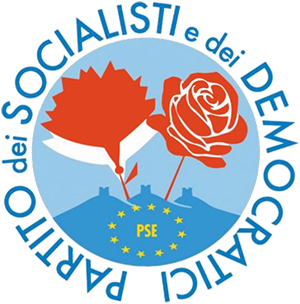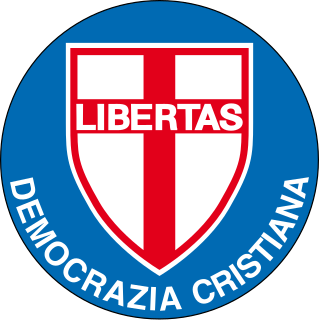
Benedetto "Bettino" Craxi was an Italian politician, leader of the Italian Socialist Party from 1976 to 1993 and Prime Minister of Italy from 1983 to 1987. He was the first member of the PSI to hold the office and the third Prime Minister from a socialist party. He led the third-longest government in the Italian Republic and he is considered one of the most powerful and prominent politicians of the so-called First Republic.

The Italian Democratic Socialists were a social-democratic political party in Italy. The party was the direct continuation of the Italian Socialists, the legal successor of the historical Italian Socialist Party. Also the Italian Democratic Socialist Party, the other long-time Italian social-democratic party, was merged into it.

The Italian Socialist Party was a socialist and later social-democratic political party in Italy. Founded in Genoa in 1892, the PSI dominated the Italian left until after World War II, when it was eclipsed in status by the Italian Communist Party. The Socialists came to special prominence in the 1980s, when their leader Bettino Craxi, who had severed the residual ties with the Soviet Union and re-branded the party as liberal-socialist, served as Prime Minister (1983–1987). The PSI was disbanded in 1994 as a result of the Tangentopoli scandals. Prior to World War I, future dictator Benito Mussolini was a member of the PSI.

The Party of Socialists and Democrats is a social-democratic and democratic socialist political party in San Marino. It is a member of the Socialist International and its current-day Italian counterpart is the Democratic Party.

General elections were held in Italy on 28 April 1963, to select the Fourth Republican Parliament. It was the first election with a fixed number of MPs to be elected, as decided by the second Constitutional Reform in February 1963. It was also the first election which saw the Secretary of Christian Democracy to refuse the office of Prime Minister after the vote, at least for six months, preferring to provisionally maintain his more influent post at the head of the party: this fact confirmed the transformation of Italian political system into a particracy, the secretaries of the parties having become more powerful than the Parliament and the Government.

General elections were held in Italy on 19 May 1968 to select the Fifth Republican Parliament. Democrazia Cristiana (DC) remained stable around 38% of the votes. They were marked by a victory of the Communist Party (PCI) passing from 25% of 1963 to c. 30% at the Senate, where it presented jointly with the new Italian Socialist Party of Proletarian Unity (PSIUP), which included members of Socialist Party (PSI) which disagreed the latter's alliance with DC. PSIUP gained c. 4.5% at the Chamber. The Socialist Party and the Democratic Socialist Party (PSDI) presented together as the Unified PSI–PSDI, but gained c. 15%, far less than the sum of what the two parties had obtained separately in 1963.

The Friuli-Venezia Giulia regional election of 1993 took place on 6 June 1993.

The Sardinian regional election of 1979 took place on 17 June 1979.

The Friuli-Venezia Giulia regional election of 1968 took place on 26 May 1968.

The Friuli-Venezia Giulia regional election of 1973 took place on 17 June 1973.

The Friuli-Venezia Giulia regional election of 1978 took place on 25 June 1978.

The Friuli-Venezia Giulia regional election of 1983 took place on 26 June 1983.

The Friuli-Venezia Giulia regional election of 1988 took place on 26–27 June 1988.
The Moro I Cabinet was the Government of Italy headed by Prime Minister Aldo Moro from 4 December 1963 until 22 July 1964 for a total of 231 days, or 7 months and 18 days. The cabinet is described as an organic centre-left government.

Lombardy elected its forth delegation to the Italian Senate on April 28, 1963. This election was a part of national Italian general election of 1963 even if, according to the Italian Constitution, every senatorial challenge in each Region is a single and independent race.
The centre-right coalition is a political alliance of political parties in Italy, active—under several forms and names—since 1994, when Silvio Berlusconi entered politics and formed his Forza Italia party.
The Pentapartito, commonly shortened to CAF refers to the coalition government of five Italian political parties that formed between June 1981 and April 1991. The coalition comprised the Christian Democracy (DC) party and four secular parties: the Italian Socialist Party (PSI), Italian Democratic Socialist Party (PSDI), Italian Liberal Party (PLI) and Italian Republican Party (PRI).

The 1993 Italian local elections were held on 6 and 20 June, on 21 November and 5 December. It was the first time where citizens could vote both for the mayor and the city council.











